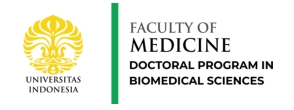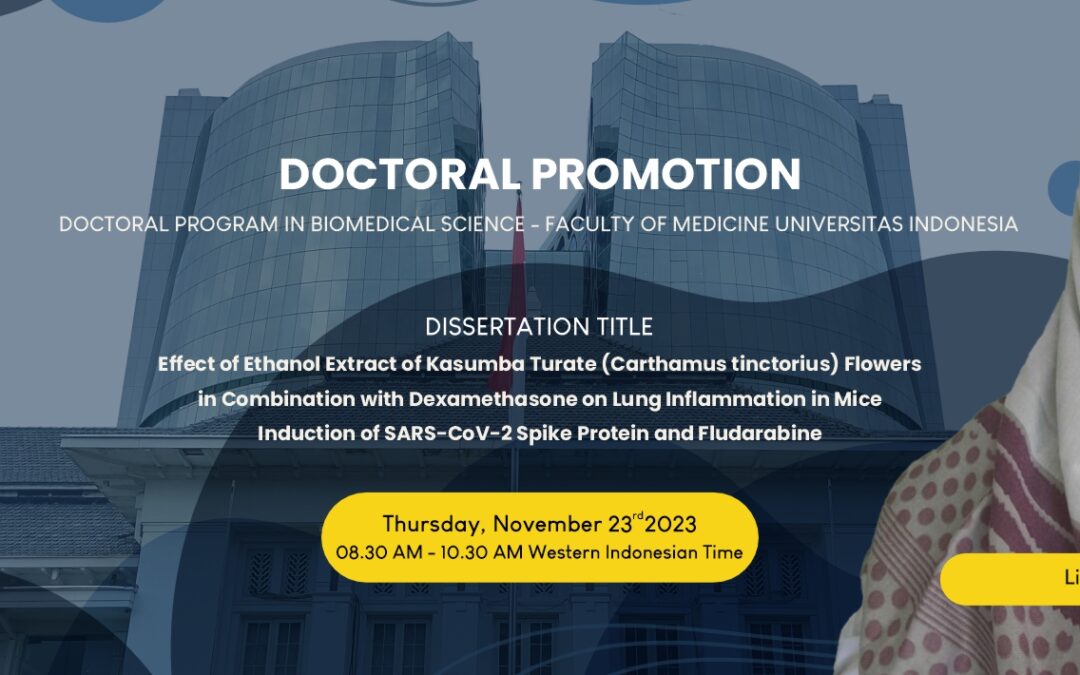By Dr. Lismayana Hansur, M.Sc
COVID-19 became a global problem in 2020, in Indonesia COVID-19 caused the deaths of more than 160,000 people until 2023. Even though the pandemic has now ended, excessive inflammatory reactions to COVID-19 can still occur in patients with certain risk factors. The anti-inflammatory drug currently available, namely Dexamethasone is not optimal in reducing hyper-inflammation.
Research recently carried out by Lismayana, with a team of promoters Prof. Dr. Melva Louisa, S.Si., M. Biomed, dr. Jamal Zaini, Sp.P(K)., Ph.D. and Dra. Beti Ernawati Dewi, Ph.D. evaluated the effect and mechanism of action of ethanol extract of Carthamus tinctorius (C. tinctorius) flowers administered together with dexamethasone in a mouse lung inflammation model created as a COVID-19 model by induction of SARS-CoV-2 spike protein. The results of this study show that the active compounds in the flowers of C. tinctorius have anti-inflammatory potential in COVID-19.
This study shows that the combination therapy of dexamethasone and extract of C. tinctorius has a promising effect in reducing inflammation and can improve the immune response in a COVID-19 infection model. This research found that the joint use of dexamethasone and Carthamus tinctorius flower extract can effectively reduce inflammatory markers in the blood and increase the regeneration of damaged lung cells. The results of the study also showed a decrease in cell infiltration in lung tissue, normalization of the ratio of lymphocytes and macrophage cells, and an increase in interferon-gamma (IFN-γ) levels in the lungs, which plays a key role in the immune response to infection. This therapy also affects immune cells in lung tissue, contributing to the body’s inflammatory and defense response. In addition, the combination increases the production of cells that regulate the formation of anti-inflammatory cytokines in the lungs. Although further research is needed to understand the mechanism in-depth and validate it in humans, these results demonstrate the potential use of this combination therapy in treating inflammatory lung diseases.
This research opens the door to the development of herbal medicines as companion medicines in the treatment of inflammation in COVID-19 disease. In addition, this study has also tested acute toxicity to assess the safe dose, and the results show that the ethanol extract of C. tinctorius flowers can be considered a non-toxic substance up to 2000mg/kg rat body weight.
This research has been accounted for in front of a team of examiners who are experts in their fields: headed by an expert in immunology (Dr. Heri Wibowo, M.Biomed), making animal models (Dr. Dr. Puspita Eka Wuyung, MS), Bioinformatics (Dr. Fadillah, MSi) and Pharmacologist from BRIN (Dr. Marissa Angelina, M.Farm). Further research, namely phase 1 clinical trials, will be the next step to validate the results of this research, so that it can be used in patients with severe inflammation.
These findings support the importance of deeper research in developing natural compounds for appropriate COVID-19 therapy. This research could be an important step in controlling inflammation caused by COVID-19. The combined ability of this research can increase lymphocytes which does not rule out the possibility of being developed for severe inflammation due to viral and bacterial infections, autoimmune diseases, rheumatoid arthritis, and ulcerative colitis which are closely related to severe inflammation.

